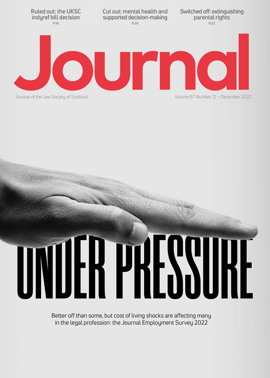PRRs: when to declare the end?

Outwith the context of adoption or permanence cases, where a natural parent’s parental responsibilities and rights (“PRRs”) are removed or restricted, it is fairly uncommon for litigation regarding extinction or restriction of PRRs to come before the court. The only other way to extinguish or to limit a person having PRRs is by application to the court for an order under s 11(2)(a) of the Children (Scotland) Act 1995. I have received a number of instructions on this topic recently, and in light of the limited case law, I decided to set out my thoughts on the law and summarise some relevant decisions from the courts.
The 1995 Act
PRRs are set out in ss 1 and 2 of the Act. In addition, s 3 covers those who may obtain PRRs. By s 3(1):
“(a) a child’s mother has parental responsibilities and parental rights in relation to him whether or not she is or has been married to, or in a civil partnership with, his father;
“(b) …his father has such responsibilities and rights in relation to him only if (i) married to, or in a civil partnership with, the mother at the time of the child’s conception or subsequently, or (ii) where not married to, or in a civil partnership with, the mother at that time or subsequently, the father is registered as the child’s father under any of the enactments mentioned in subsection (1A)”.
By s 11(7), in considering any decision regarding PRRs, the court must:
- have regard to the welfare of the child as its paramount consideration;
- consider whether it would be better for the child that the order be made than none made at all;
- give the child an opportunity to indicate whether he or she wishes to express their views and if so to give an opportunity to express them.
Case law
M v M [2021] SC GLW 012; [2018] 4 WLUK 730
The court made an order under s 11(2)(a) of the Act depriving a father, who had been convicted of rape, of his PRRs in respect of his nine year old son (D). The order was made having regard to the child’s best interests and his views, and not on the sole basis of the father’s criminal conviction.
During the parties’ relationship, the father had been verbally and physically abusive towards the mother. They had separated in 2011. The children remained with their mother. The father had PRRs in respect of D but not his daughter (S), and he was not named as her father on her birth certificate. In 2013, more than two years after he had last had contact with the children, the father applied for a contact order. In 2014, he was granted an interim order for contact at a contact centre. No contact with S took place, but he had two contact visits with D. Direct contact was subsequently stopped after D became upset during visits. The initial contact proceedings concluded in 2014 with a final order for letterbox contact. In 2015, the father, who had a number of previous convictions, pled guilty to the rape of a former partner and was sentenced to three and a half years’ imprisonment.
By minute raised in 2016, the mother sought deprivation of the father’s PRRs. The first time the father had attempted to exercise letterbox contact was on receipt of court papers. D was angry and upset on receiving cards from his father. S displayed no emotional reaction to them and put them in the bin. D expressed his views clearly to an appointed child welfare reporter. He was frightened of his father. He worried about him coming to his home. He did not want to see him again.
Given D’s distress following letterbox contact, and having regard to his views, it was in D’s best interests for the contact to be terminated. Conversely, there was no apparent detrimental effect to S. The court was therefore unable to conclude that recalling the order for letterbox contact would be in her best interests.
Deprivation of PRRs did not automatically follow a criminal conviction, even where it related to harmful conduct towards a child. The welfare of the child remained the paramount consideration. The views of the child are relevant, as are any prior convictions of a party, or their alleged conduct.
The father lacked motivation and commitment to maintaining contact with D, and D had expressed clear views about his aversion to his father’s role in his life. In light of this, the court granted an order suspending a number of the father’s specific PRRs in relation to D.
S v J [2012] CSOH 49
The parties were unmarried. The father (F) sought orders in respect of his daughter C, aged one at proof, for PRRs, contact, and interdict against C’s removal from the United Kingdom. The mother (M) opposed these orders and sought a residence order and interdict against C’s removal from the United Kingdom.
M was Scottish and F Iranian with British citizenship. M and F moved to Scotland from England to stay with M’s family during the latter stages of her pregnancy. Following C’s birth in Scotland, they returned to England. M returned with C to Scotland following the termination of her relationship to F.
F was not registered as the father on C’s birth certificate, and had had no direct contact since C was approximately six weeks old.
The court considered the provisions of s 11(7A)-(7E) on account of findings in fact that before meeting M, F had physically assaulted the child (H) of his wife (W), had thrown a pan containing hot cooking oil while H and W had been in the room, and had struck out at various inanimate objects during the marriage, all in temper. F’s behaviour towards M could be considered controlling.
In relation to PRRs, the court determined:
- F was an important source of information about, and a bridge to, C’s cultural background and heritage. Expert evidence from a psychologist found that C would benefit from direct contact with F. Notwithstanding their serious nature, incidents concerning F’s volatile and abusive behaviour were historic. There was no suggestion of violence towards M or C.
- It was in C’s best interests that F be awarded the specific parental responsibility and right of contact only. Direct supervised contact should be allowed to develop for a significant period without interruption. M’s wish to move abroad had to yield to the importance of C establishing a relationship with F.
- F had had no active involvement in C’s upbringing since she was around six weeks old; made no real effort to support M; and there was little prospect of F and M being able to co-operate over matters affecting C. Accordingly, additional PRRs should not be granted in favour of F.
T v T [2000] ScotCS 283; 2000 SLT 1442
The sheriff’s decision to remove all of F, the natural father’s PRRs was one element of his decision that was considered on appeal to the Inner House. The other element was the contact order sought by F in respect of his daughter E.
A critical element of the sheriff’s decision related to evidence from a police officer regarding answers given by E at an interview shortly after her fourth birthday. E disclosed that she had been sexually abused by F during a contact visit at F’s mother’s house. E was called to give evidence. The sheriff found her to be a credible witness. F appealed on the ground that the order depriving him of all PRRs was unnecessarily sweeping.
The Inner House was critical of the sheriff’s approach to the assessment of the evidence and his conclusions. This can be seen from the comments of Lord President Rodger at paras 58-68 of the opinion. In particular:
- the sheriff had approached the central issue, the alleged sexual abuse, with a completely unjustified preconception, amounting to a fatal flaw; and
- the sheriff had failed to assess witness credibility or reliability, including F and M, the mother; had failed to explain why he accepted M’s evidence rather than F’s expert witness; and had discounted a report by the latter which in fact did not exist.
As the court was in no position to determine the matters in dispute, the case was remitted to a different sheriff.
Lessons from the cases
While there may be instances where it is proportionate to extinguish all PRRs held by a party, the court does not approach the task lightly. Clear pleadings setting out the specific PRRs which the court is invited to extinguish, and the reasons for their extinction, are to be encouraged.
The child’s best interests will be the court’s paramount consideration. The court will apply the facts and circumstances of the case to each child individually, rather than making a collective decision for all of the children. A sweeping approach from the court of first instance will not suffice. The treatment of the facts and circumstances of a case is of significant importance in allowing the court to assess fully what is in the child’s best interests. Failure to set out the court’s reasoning adequately may be fatal to its decision standing.
The recent case law shows the courts being more willing to suspend particular PRRs, as a more proportionate measure which in some circumstances can achieve the same legitimate outcome.
There is a place for actions to extinguish PRRs in the courts, but clients should be fully advised of the risks and rewards of instructing such a course of action. It is not a step which should be taken lightly, or simply included into an action where other s 11 orders – such as residence orders or specific issue orders – are sought.
Perspectives
Features
Briefings
- Criminal court: Farewell retrospective
- Agriculture: A future support framework
- Corporate: Is there a creditor duty?
- Intellectual property: "Reclaiming the UK statute book"
- Sport: Flouting their own rules?
- Succession: Crofting tenancy transfers in intestacy
- Scottish Solicitors' Discipline Tribunal: December 2022
- Property: Conveyancing – the future is in our hands
- In-house: With a fair wind







